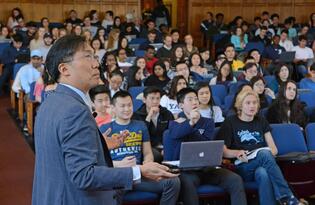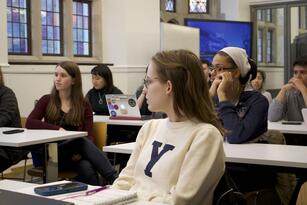For Faculty


On this page:
What We Do
Faculty Tips
What Faculty Can Do to Support Student Learning
What We Do
Students begin Yale College with a wide range of educational experiences that affect how they engage and learn in their courses. The Academic Strategies Program is designed to share knowledge with Yale students about the mindsets, techniques and practices that can best help them find satisfaction in their learning and ownership in their educational choices. To help students learn about our services, invite an Academic Strategies Peer Mentor to offer a 2-minute presentation at the beginning or end of your class. You can request this by contacting the Director of Academic Strategies, Dr. Karin Gosselink, at karin.gosselink@yale.edu.
Workshops
Each Academic Strategies workshop offers both metacognitive and practical approaches to students’ academic work. Led by junior and senior Yale College students, these workshops address common academic challenges for many Yale students, including managing their time, cultivating faculty mentorship, learning effective strategies for lectures, seminars, and exams, managing a heavy reading load, and creating plans for a senior thesis. You can find information about upcoming workshops here or you can email Dr. Gosselink (karin.gosselink@yale.edu) to find out more.
Peer Mentoring: Both 1-1 and Small Group
Our Academic Strategies Mentors offer individual and small group peer consultations to help students develop approaches to their academic work tailored to their specific strengths, needs, and challenges. Students often use these meetings to plan their work in busy periods of the semester, such as midterms and finals, or to get advice on new approaches to their work for particularly challenging courses. Students can set up mentoring appointments through this online schedule: https://yalectl.mywconline.com/index.php?msgLOG=YES or by emailing us directly to request a mentor at academicstrategies@yale.edu. Back to top
Faculty Tips
Share Asynchronous Teaching Material Early
Asynchronous teaching elements can be enormously helpful to students and relieve the pressure on student schedules. Try making flipped lecture content, such as videos and lecture slides, available to students before class meetings. This will enable students in different time zones have time to view it before your synchronous class. Other additional materials to structure their learning experience, such as outlines or discussion questions, can support comprehension as well as improve engagement.
Collaborative Work
Collaborative work can be challenging at times, especially in smaller classes where there may be fewer students, or among students with busy schedules. Classroom surveys may allow students to match with others in their personal schedules more easily. Assignments that allow for asynchronous collaboration or fewer in-person meetings are another possibility, as is a flexible option that allows for independent work.
Organize Study Groups
Many students find study groups valuable, but they often develop around spontaneous interactions on campus. If possible, explicitly facilitate the development of student study groups by helping interested students find each other.
Flexible Timing
Timed deadlines can create unnecessary stress. Consider identifying a range of time to submit an assessment of complete an exam may be easier for most students. You might need to adjust office hours to accommodate students’ more limited schedules. In some cases, alternative assessments (a harder and longer problem set, an essay) may be a better fit for other students. Students mentioned that having the option of choice in assignments and assessments allowed them to identify the learning method or assessment that worked best for their situation. Back to top
For STEM professors: STEM Navigators
STEM Navigators is a pilot program that aims to provide helpful, practical resources to Yale first-years and sophomores pursuing STEM courses and majors. This network of support includes STEM Academic Strategies Mentors who can provide individualized information and support, peer sharing events on major intro STEM courses, practical workshops on internship and/or fellowship applications, and biweekly study halls for collaboration on assignments and problem sets. Please direct struggling students to this resource, which recognizes the large gap between high school and college STEM education.
How Faculty Can Support Students’ Academic Efforts
1) Normalize asking for help
Last year, 51% of Yale College students attended academic support programming. This programming includes course-based peer tutoring, Science & QR tutoring, writing tutoring, and Academic Strategies workshops and mentoring. These services are not remedial; instead, they offer students opportunities to reflect critically on their own academic practices and find information and support as they develop new ways of approaching the challenging work Yale classes require. You can help by advertising these services broadly in your class lectures and discussions, and providing information about these services in your syllabus and on your Canvas site. General information about these services can be found here: https://poorvucenter.yale.edu/Undergraduates
2) As a group, ask your students to tell you about their previous experience with your course’s topic/discipline
Understanding what students know and don’t know about the course topic can help you fill in gaps and make explicit connections that can help all students better understand the content and frameworks in your course.
3) Practice inclusive teaching strategies
Inclusive teaching strategies can benefit all students by creating multiple points of access to the topic and encouraging all students to contribute to the academic conversation fostered in your course. For more information about inclusive teaching practices, visit the Poorvu Center’s Faculty Resources page: https://poorvucenter.yale.edu/FacultyResources/Diversity-Inclusion.
Other Ways to Contribute
Want to work directly with students participating in Academic Strategies programming and/or the First-Generation/Low-Income (FGLI) Community Initiative (co-sponsored by the Yale College Dean’s Office and the CTL)? Occasionally Academic Strategies and the FGLI Community Initiative host one-off events where faculty participation can help students further develop and practice the strategies they’ve learned through our programming.
Questions? Contact Dean Karin Gosselink, Ph.D., Director, Academic Strategies Program and Office of Educational Opportunity, at karin.gosselink@yale.edu, or Lynda Paul, Ph.D., Associate Director, Academic Strategies Program, at lynda.paul@yale.edu.
